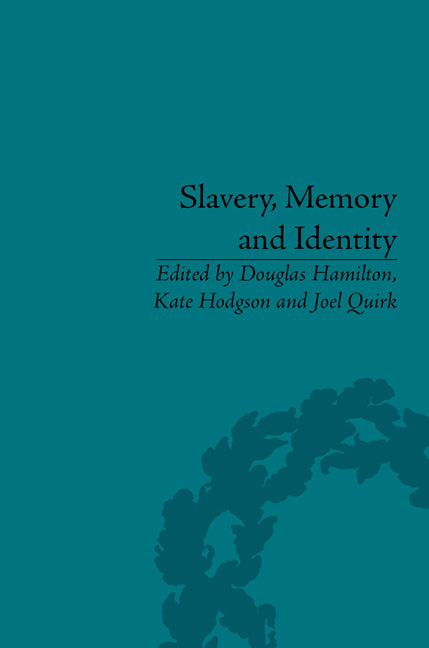Book contents
- Frontmatter
- CONTENTS
- Acknowledgements
- List of Contributors
- Introduction: Slavery, Memory and Identity: National Representations and Global Legacies
- 1 ‘A Thoroughly National Work’: The Politics of Blame and European Abolitionist Identities
- 2 From Slave Quarters to Wigwams: Native American Slaveholding and the Debate over Civilization
- 3 For Civilization's Sake: Legal Abolition of Slavery in Nepal and Sierra Leone in a Global Perspective, 1920–30
- 4 The Heritage of Slavery and Nation Building: A Comparison of South Africa and Mauritius
- 5 Picturing Slavery: The Perils and Promise of Representations of Slavery in the United States, the Bahamas and England
- 6 ‘History Must be Re-Written!’: Revisionist Ambitions among West African Slave Descendants
- 7 Contrapuntal Memories of Slavery and Abolition in the French-Speaking World
- 8 Public Memory of Slavery in Brazil
- 9 Learning to Remember and Imagine Slavery: The Pedagogies of Museum Field Trips in the Representation of ‘Difficult’ Histories
- 10 Slavery and Racism as the ‘Wrongs’ of (European) History: Reflections from a Study on Portuguese Textbooks
- Notes
- Index
9 - Learning to Remember and Imagine Slavery: The Pedagogies of Museum Field Trips in the Representation of ‘Difficult’ Histories
- Frontmatter
- CONTENTS
- Acknowledgements
- List of Contributors
- Introduction: Slavery, Memory and Identity: National Representations and Global Legacies
- 1 ‘A Thoroughly National Work’: The Politics of Blame and European Abolitionist Identities
- 2 From Slave Quarters to Wigwams: Native American Slaveholding and the Debate over Civilization
- 3 For Civilization's Sake: Legal Abolition of Slavery in Nepal and Sierra Leone in a Global Perspective, 1920–30
- 4 The Heritage of Slavery and Nation Building: A Comparison of South Africa and Mauritius
- 5 Picturing Slavery: The Perils and Promise of Representations of Slavery in the United States, the Bahamas and England
- 6 ‘History Must be Re-Written!’: Revisionist Ambitions among West African Slave Descendants
- 7 Contrapuntal Memories of Slavery and Abolition in the French-Speaking World
- 8 Public Memory of Slavery in Brazil
- 9 Learning to Remember and Imagine Slavery: The Pedagogies of Museum Field Trips in the Representation of ‘Difficult’ Histories
- 10 Slavery and Racism as the ‘Wrongs’ of (European) History: Reflections from a Study on Portuguese Textbooks
- Notes
- Index
Summary
The prevailing rhetoric of remembering and teaching difficult histories, such as the Holocaust or transatlantic slavery, is one of ‘never again’: learning centres on remembering the past so that such atrocities will not happen in future generations. In order to understand the intergenerational transmission of memories of slavery through education, this chapter focuses on the museum as a key cultural and educational medium. It explores the potential value of drama, performance and role play in the experiences of school pupils learning to remember and imagine slavery through field trips. The issue of how museums can facilitate new forms of learning and experience which differ from other more conventional modes of educating people about the past is investigated through the analysis of qualitative data; this is not an area to which much consideration has been given in the existing literature of teaching slavery.
The rhetoric and pedagogies of difficult history education are particularly interesting in the context of periods of heightened commemorative activity, such as the 2007 bicentenary of the abolition of the British slave trade, an overview of which is given in the first section of this chapter. The significance of the activity around the bicentenary in contributing to more reflexive and critical teaching of the history of the British Empire in schools is arguably one of the most notable achievements of the commemorative year. Furthermore, at conferences and workshops around the time of the bicentenary, the educational potential of museums was frequently at the centre of discussions highlighting the conflation of learning, commemoration and difficult histories within the discursive practices of academia and the heritage and education sectors. Difficult histories here are akin to S. Macdonald's understanding of ‘difficult heritage’, which she defines as ‘a past that is recognized as meaningful in the present but that is also contested and awkward for public reconciliation with a positive, self-affirming contemporary identity’.
- Type
- Chapter
- Information
- Slavery, Memory and IdentityNational Representations and Global Legacies, pp. 131 - 150Publisher: Pickering & ChattoFirst published in: 2014



